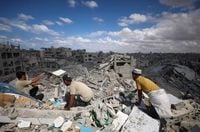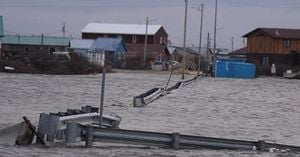As Gaza’s battered landscape bears the scars of months of conflict, a new wave of international initiatives is emerging, each aiming to tackle the daunting task of reconstruction and recovery. In recent days, European and Middle Eastern leaders have stepped forward with ambitious proposals, but the path ahead remains fraught with political sensitivities, security challenges, and the sheer scale of devastation.
On October 13, 2025, the Italian government made headlines by unveiling a comprehensive plan to contribute to the stabilization of Gaza. According to La Repubblica, Italy’s proposal centers on dispatching specialized military engineer units tasked with demining operations across the conflict-ravaged enclave. These efforts are not just about clearing explosives; they’re intended as the first step in a broader initiative to rebuild vital infrastructure and support regional stability after the recent hostilities.
But Italy’s plan doesn’t stop at engineering. The government is also considering deploying approximately 200 Carabinieri special forces—Italy’s renowned military police—to train Palestinian security personnel. The Carabinieri, with their extensive experience in internal security and counter-terrorism, would play a pivotal role in preparing local forces to maintain order and prevent renewed violence. However, security concerns have already forced a rethink: while initial plans envisioned training in Jericho in the West Bank, instability and Israeli military control in the area have made this option unlikely. Instead, Italian officials are eyeing their established center in Vicenza, Italy, as a safer and more practical training ground. Still, they haven’t ruled out a future Carabinieri deployment inside Gaza, provided a peacekeeping force made up of Arab or Islamic nations is established first.
Italy’s announcement comes as part of a flurry of diplomatic activity across Europe and the Middle East. Just this week, senior officials from a range of Middle Eastern and European nations gathered privately at Wilton Park in West Sussex, UK, to quietly lay the groundwork for what they hope will be a Palestinian-led recovery in Gaza. According to the UK prime minister’s office, the three-day conference brought together not only government representatives from the Palestinian Authority, Jordan, Saudi Arabia, Germany, and Italy, but also major financial institutions such as the World Bank and the European Bank for Reconstruction and Development.
UK junior foreign minister Hamish Falconer, speaking at the event, underscored the enormity of the challenge: “We must be ready to act, to clear rubble, rebuild homes and set up infrastructure, restoring access to education and healthcare.” He didn’t mince words about the scale or urgency, noting, “We know the scale of the task. We know how urgent it is, and how complex it will be.” Falconer also highlighted that recovery would “take years and cost billions,” and that unlocking the required resources would demand creativity beyond traditional donor finance—potentially bringing in private capital with the UK leveraging its expertise in investment and its strong ties to the City of London.
While these international meetings may not be as high-profile as some summits—certainly less so than the recent gathering at Sharm el-Sheikh in Egypt—their low-key nature belies the significance of what’s at stake. The Israeli assault on Gaza has left much of the territory in ruins and the majority of its population displaced, according to the UK government. The talks in West Sussex, as described by the UK Foreign Office, were designed to convene “crucial planning and coordination efforts for postwar Gaza.” The hope, as Falconer put it, is to lay the groundwork for “long-term economic development,” recognizing that “Gaza and Palestine more broadly, has real economic potential.”
Germany, too, has been vocal about the need for swift action. On October 9, German Foreign Minister Johann Wadephul told reporters at a hastily convened conference in Paris, “We are ready to provide humanitarian aid to the Gaza Strip immediately.” Wadephul, who had left a Western Balkans meeting in Belfast to attend, stressed the urgency: “Action must be taken swiftly because thousands of people are still under threat there.”
Wadephul’s vision extends beyond immediate relief. He has proposed hosting a reconstruction conference jointly with Egypt, emphasizing that such a gathering must be “politically broader” and should “always keep in mind that there will ultimately have to be a two-state solution.” Crucially, he insisted that Israel must be involved in the reconstruction process, something he felt was lacking in Paris. “We need a legal framework for everything that is now taking place in the Gaza Strip,” he said, calling for a United Nations mandate to legitimize any future development efforts.
Germany’s commitment is echoed by politicians from its governing coalition, who see multiple reasons to help rebuild Gaza—from migration and security policy to humanitarian concerns and, as CDU foreign policy expert Jürgen Hardt put it, “on grounds of Staatsräson.” This term refers to Germany’s historic commitment to Israel’s security, rooted in its responsibility for the Holocaust. SPD foreign policy spokesman Adis Ahmetovic has suggested that Germany could contribute specifically to “the construction of temporary accommodation, the removal of rubble, the restoration of the water supply, and the construction of sanitary facilities.” Development Minister Reem Alabali Radovan has made similar proposals in recent months, though concrete plans remain in development. “I can’t give you any further details at this stage, except to say that the conference will take place,” Foreign Office spokesman Martin Giese told DW, adding, “The context is clear: it’s about the reconstruction of Gaza. But of course, it’s also about long-term solutions for stability in the region, including the protection of Israel from further aggression.”
Not everyone is on board with the European-led efforts. Israeli Foreign Minister Gideon Sa’ar has sharply criticized the Paris meeting, calling it “unnecessary and harmful.” In a post on X, Sa’ar accused French President Emmanuel Macron of using the conference to “divert attention from his domestic problems at Israel’s expense.” Tensions between Israel and France have worsened since Macron recognized a Palestinian state in September—a move not echoed by Germany or other European powers. The role that Europe will ultimately play in Gaza’s reconstruction is still up in the air, especially as the US, according to a recent 20-point plan outlined by President Donald Trump, appears to assign Europe only a minor role in the initial stages of peacebuilding.
Despite these diplomatic hurdles, one thing is clear: the international community recognizes both the urgency and the complexity of Gaza’s recovery. As plans are debated and refined, the people of Gaza remain caught in the crossfire of geopolitics, waiting for the promised aid, reconstruction, and a chance at a stable future. The coming months will reveal whether these ambitious proposals can translate into real progress on the ground—or whether political divisions will once again stall the path to peace and recovery.




